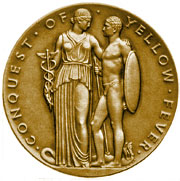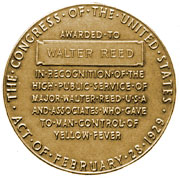| Walter Reed Medal | |
|---|---|
 Front (A) and back (B) of the Walter Reed Medal. Front (A) and back (B) of the Walter Reed Medal. | |
| Awarded for | Meritorious achievement in tropical medicine or global health by an individual or an institution |
| Sponsored by | American Society of Tropical Medicine & Hygiene |
| First awarded | 1936 |
| Website | https://www.astmh.org/awards-fellowships-medals/awards-and-honors/walter-reed-medal |
The Walter Reed Medal may refer to the Congressional Gold Medal awarded to Major Walter Reed in 1929, or a medal currently awarded by the American Society of Tropical Medicine and Hygiene.
The Walter Reed Medal was established by the American Society of Tropical Medicine and Hygiene in 1934 to be awarded periodically in recognition of meritorious achievement in tropical medicine by an individual or an institution. The story of how Walter Reed led the Yellow Fever Commission in Havana that discovered the mosquito vector of the disease is legendary. The first medals were awarded in 1936, one medal was awarded to Mrs. Emilie Lawrence Reed to posthumously honor her husband Major Walter Reed for his work on Yellow Fever, and another to The Rockefeller Foundation for its study and control of Yellow Fever. Starting in 2021, the Walter Reed Medal was awarded annually.
It is of interest that in 1942 in a spirit of ecumenism, the award was made posthumously to Carlos J. Finlay - a Cuban contemporary of Walter Reed - to whom many credit the original idea that Yellow Fever was a mosquito-borne disease.
Awardees
- 2024 - Stephen L. Hoffman
- 2023 - Charles H. Calisher
- 2022 - William A. Petri, Jr.
- 2021 - Dyann Wirth
- 2020 - Myron “Mike” Levine
- 2017 - Scott Halstead
- 2015 - Alan J. Magill
- 2014 - Scott C. Weaver
- 2011 - Louis Miller
- 2008 - Richard L. Guerrant
- 2005 - Karl Johnson
- 2002 - Thomas Monath
- 1999 - Philip Russell
- 1996 - Thomas Weller
- 1993 - Donald Henderson and George Craig, Jr. and Robert Shope
- 1990 - Paul Beaver and Will Burgdorfer
- 1987 - William Reeves
- 1984 - Wilbur Downs
- 1981 - Harry Most
- 1978 - Harry Hoogstraal
- 1975 - Robert Briggs Watson
- 1972 - Fred Soper
- 1969 - Albert Sabin
- 1966 - Henry Meleney
- 1963 - Ernest Carroll Faust
- 1962 - William Cort
- 1960 - Sir Gordon Covell
- 1958 - Willard Wright
- 1956 - Karl Meyer
- 1953 - Lewis Hackett
- 1950 - Rolla Dyer
- 1948 - Nicolaas Swellengrebel
- 1946 - Paul Russell
- 1944 - James Simmons
- 1942 - Carlos Finlay
- 1940 - Herbert Clark
- 1939 - William Castle
- 1936 - Mrs. Walter Reed and The Rockefeller Foundation
Associated Awards


Of note, in conjunction with Walter Reed's receipt of the Congressional Gold Medal, the United States Congress established the Yellow Fever Roll of Honor on February 28, 1929 (Public Law 70-858, 45 Stat. 1409) to each of the persons listed below, "in special recognition of the high public service rendered and disabilities contracted in the interest of humanity and science as voluntary subjects for the experimentations during the yellow-fever investigations in Cuba"
- Aristides Agramonte
- James A. Andrus
- John R. Bullard
- James Carroll
- Doctor R. P. Cooke
- A. W. Covington
- William H. Dean
- Thomas M. England
- Levi E. Folk
- Wallace W. Forbes
- Paul Hamann
- James L. Hanberry
- James Hildebrand
- Warren G. Jernegan
- John R. Kissinger
- Jesse W. Lazear
- John J. Moran
- William Olsen
- Walter Reed
- Charles G. Sonntag
- Edward Weatherwalks
- Clyde L. West
On July 2, 1956, Congress passed a law (70 Stat. 484) to include Gustaf E. Lambert on the list.
On September 2, 1958, Congress passed a law (72 Stat. 1702) to include Roger P. Ames on the list.
References
- "Congress Honors the Yellow Fever Commission". Journal of the American Medical Association. 92 (12): 984. 1929-03-23. doi:10.1001/jama.1929.02700380042014. ISSN 0002-9955.
- ^ "ASTMH - Walter Reed Medal". www.astmh.org. Retrieved 2024-11-14.
- ^ "Award of THE WALTER REED MEDAL". Science. 100 (2605): 490. December 1944. doi:10.1126/science.100.2605.490.b. ISSN 0036-8075. PMID 17734184.
- "Yellow Fever Roll of Honor Act, 1929 ~ P.L. 70-858" (PDF). 45 Stat. 1409 ~ H.R. 13080. USLaw.Link. February 28, 1929.
- "Yellow Fever Roll of Honor Amendment Act, 1956 ~ P.L. 84-644" (PDF). 70 Stat. 484 ~ H.R. 5590. US Government Printing Office. July 2, 1956.
- "Yellow Fever Roll of Honor Amendment Act, 1958 ~ P.L. 85-879" (PDF). 72 Stat. 1702 ~ H.R. 7544. US Government Printing Office. September 2, 1958.